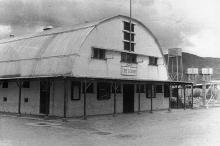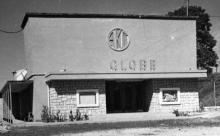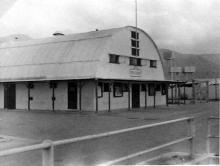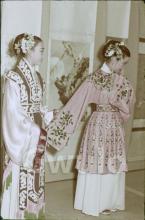The Globe (Shek Kong Camp) [1952-1996]
Primary tabs
Address: Kam Tin Road, Shek Kong Camp, Shek Kong, Hong Kong
Cinema Treasures provided an interesting write-up about this remotely-located theatre, as follows: "The Globe was a neighbourhood cinema for the Royal Air Force and their families living in the Shek Kong Camp in the New Territories. The Shek Kong Camp with an airfield and barracks, etc., was built in the early-1950s and was the only (*see note below) air base of the Royal Air Force in the British Colony in Hong Kong before 1st July, 1997..... The Shek Kong Camp formally closed in November 1996, and the theatre became a property of the People's Liberation Army stationed in Hong Kong SAR"
[Edit Feb 20, 2017: The seating capacity is estimated to be about 100. Credit goes to David and Fred for the correct photo.]
[*Edit Feb 27, 2017: Reader Tideswell27 has pointed out that the RAF also had a base at Kai Tak International Airport prior to 1997.]
For the purpose of this page, the operating period is estimated to be from 1952 to November 1996.
Shek Kong Army Camp - https://gwulo.com/shek-kong-army-camp-barracks#17/22.43720/114.08871/Map...
Source: Cinema Treasures: http://cinematreasures.org/theaters/32313





Comments
Fred Evans was in this camp
Fred Evans was in this camp in the late 1950s and took this photo:
I wrote to double-check this was a photo of the cinema, and Fred replied:
Yes, it was indeed our camp cinema. It was situated a few yards ( not metres!) from our main gate.A few yards further and the camp swimming pool, a very good one, and another few yards there was the Church of Scotland canteen/cafe with a relaxation room(s) and library... very pleasant.
I've moved the map marker to the entrance of the camp.
Global Theatre (Shek Kong Camp)
Greetings, and thanks David and Fred for the right marker. The original marker was transferred from the source and I was wondering why the theatre was located more remote than the remote camp. Now I wonder about the source photos. Here, the front entrance is flushed with the ground and the front wall unlike the others showing several steps to the front door that was recessed from the front wall. There was likely no economic incentive to beautify its facade so if any, it would be after the 1997 transfer. Fred's photo shows a pitch roof and no sign of a second level. The other photos show a second level walk-out from the side, and possibly a flat roof, indicating it was by design a residential building. The cat - I should have checked with him first. Regards, Peter
The Globe
The name on the photo looks more like "The Globe". That seemed likely, as it's a famous name for theatres.
I checked with Fred, and he replied:
I've realised that all army cinemas were named The Globe. My old pal Robbie Smith reminded me.
This page about the history of British military cinemas confirms:
The Army cinemas were always named The Globe while the RAF would have cinemas named Astra, there were a few exceptions to this rule.
(Was there any Astra cinema in Hong Kong?)
And to round off, here's a 1956 programme from "Globe Cinema, Sek Kong".
Differences in photos
Hi Peter,
I guess the different appearance of the cinema between Fred's 1950s photo, and the recent photo on CinemaTreasures is because they're of different generations of buildings. The oldest photos of the camp show the men living in tents. By the time Fred was there they were in Nissen huts, and his cinema looks to be a similar type of pre-fabricated building, quick to install. Better, concrete buildings likely replaced the Nissen huts over time.
Regards, David
The Globe (Sek Kong)
Sorry, but it is not strictly true that Sek Kong was the only RAF air base in the British colony of Hong Kong before 1July 1997.
The RAF had a "base" at Kai Tak International Airport close to 1997, although perhaps not helicopters of 28 (AC) Squadron close to that date.
The aircraft had most definitely been moved to Sek Kong before 1997, but I can recall that the RAF had a presence at Kai Tak Airport in 1993 when I was the number 3 policeman working there.
The Globe (Sek Kong)
Greetings, and thanks Tideswell27 for the correction. I have placed an edit on the main page to make sure readers catch this fact. Regards, Peter
The address given above is
The address given above is inaccurate, assuming that it was at about the spot of the marker on the accompanying map. That spot (which is around the entrance to the former Borneo Lines) is in Kam Tin Road, not Route Twisk, as is apparent from the map.
Incidentally, there is a disused military cinema still standing next to the lower levels of Route Twisk, on the right as you ascend towards Tsuen Wan. It looks similar to the structure in the photo, though smaller.
MM
The Globe
Thank you Malcolm for the correction. No excuse, my apology for the oversight. Regards, Peter
Cinema
Of course there was a cinema in Sek Kong Village . Opposite the school playing field (called the Globe) but after it burned down it was rebuilt and called the Phoenix. The school used it for shows when the audience wouldnt fit in the Hall. I taught at the school from 1978 till 1997, when the British Army left me. I am still here, in Kowloon Tong, but had a happy time at Sek Kong School. Love to all ex staff and pupils. Sara
The Globe (Shek Kong Camp) [1952-1996] >
I have a 1957 Globe Cinema programme for Fan Gardens in Fanling. It appears that the programme was shared, as it lists four cinemas. They are Fan Gardens, Dill's Corner, Sek Kong, and Sek Kong Village, each cinema showed the film for two or three days then passed it on in the order I have listed them. I think I must have aquired the programme from Fan Gardens, during the time we were guarding the empty camp at Queens Hill, Fanling in 1957.
The Globe Cinema
Not sure where this Globe Cinema was located.
The Globe Cinema, Sek Kong
This is the cinema at Sek Kong as I remember it. When I was based there the name had been changed world-wide to the "Services Kinema Corporation" or SKC, and the signage reflected that. The position on the map is correct and it sat on a small square, opposite the Garrison Church and flanked by the Education Centre, the swimming pool, and the Garrison Group Practice medical centre.
Unlike the local Chinese film theatres the SKC did not cut their film's length to fit a two hour audience turnover, so films like the first Star Wars production at least made some kind of sense there after watching a curiously truncated version in a Kowloon cinema!
Changing names
After reading Saki's comment I found a Wikipedia page describing the cinema organisation: https://en.wikipedia.org/wiki/Army_Kinematograph_Service
It notes several changes in name:
The Globe (Sek Kong Village)
I had not before realised that there were at least four Globe army cinemas in Hong Kong; Fan Ling, Dill's Corner, Sek Kong Camp and Sek Kong Kong Village.
My wife and I used to frequently go to the cinema in Sek Kong Village on Route TWSK during the period I was a police inspector serving at Fanling Coiurt, NT PolMil and the Village Patrol Unit (VPU) in 1971-1973. It was quite a drive from Plover Cove where we lived but well worth it.
The building still exists but of course is disused as it now belongs to the PLA. It is opposite the football field and adjacent to the entrance to the Sek Kong Catchment:
http://hk.centamap.com/gc/centamaplocation.aspx?x=829177&y=831989&sx=829177.4678&sy=831989.4226&z=2&lg=b5
Globe Cinema
I lived in Sek Kong Village from 1952-1953. As a family we visited the Globe for a live Variety evening starring Bill Kerr 'Wogga Wogga' an Australian comedian and Linda Russell, singer. I went backstage after their performance and they both signed my autograph book, which I still have. We also saw a Chinese circus troup at the Globe. The swimming pool nearby was my 'second home' and I learned to swim like a fish under water. Valerie Eggleton
Astra cinema
Hi, It's taken a long time to catch up with this thread but there was at least one Astra cinema In Hong Kong. This was at R.A.F. Little Sai Wan. Prior to 1958, film shows took place each evening in the Airmen's Mess hall. There was just one projector, we sat on woden benches and we had several breaks during each film when the reels had to be changed - sometimes even re-wound, because of a shortage of empty reels. It was not unknown for the reels to be screened in the wrong order. This caused much hilarity when on one occasion the U.S. cavalry came to the rescue of a beleagured wagon train - even before the Indians had arrived on the scene. In 1958 a very small purpose built cinema was built adjoining the Mess hall. This had a sloping floor, very comfortable proper cinema seats and TWO projectors and was fully air conditioned, so we were in the lap of luxury. Being an all male camp, the only thing that the Astra lacked was to have beautiful female usherettes showing us to our seats and sellling us ice creams. In 1987, on my brief nostalgic visit to Little Sai Wan before it was demolished, I took a photograph of its stripped down interior but the attached photograph from my 1987 gallery shows what a splendid place it had been. Another photograph from Albert Hunt's gallery in the 367 Associatiion gallery and taken in 1958 shows how the Astra was added on to the end of the Airmen's Mess hall building. The three doors overlooking the road were emergency exits, with the 'proper' entrance foyer being off view to the right at the end of the building. The third image shows just how busy the Astra was in May 1960.
It is also most likely that the larger camp at R.A.F. Kai Tak also had an Astra but it would have been an older one more like the Globe at Sek Kong.